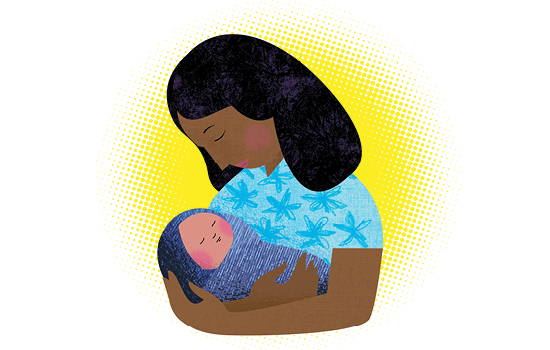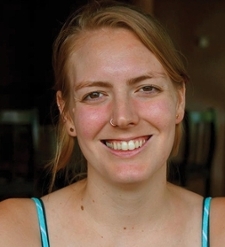Going Glocal: Maternal & Child Health
By Martha McKenzie, Illustrations by Mike Austin


Stress en la ciudad
Assessing maternal outcomes in the Latino community
Pregnancy can be a stressful time for any woman. Kaitlyn Stanhope wants to see how stress impacts pregnant Latina women in Atlanta—a group that often suffers from low income, discrimination, and worries over immigration status. “Heightened stress has been shown to be associated with unhealthy pregnancies and birth outcomes,” says Stanhope, a fourth-year PhD student in epidemiology. “But despite having a lot of social disadvantages, Latina women in the U.S. have unexpectedly healthy births, comparable to those of white women in the U.S.”
|
|
Kaitlyn Stanhope wants to know why Latina women have healthy births despite many stressors. |
Stanhope and others theorize strong social support may protect Latina women from the effects of stress. To test this idea, she is teaming with an Emory ob/gyn resident to look at maternal outcomes—such as gestational diabetes and hypertension—and birth outcomes—such as prematurity and low birth weight—in a group of Latina women.
She surveyed women in their first and second trimester at several Atlanta maternity centers, asking about the presence of chronic stressors such as unemployment, death or illness of a loved one, and divorce. The survey did not ask about immigration status or the current political climate—intentionally. “I didn’t want to include any questions that would scare people away,” says Stanhope.
She followed up with in-depth interviews with some of the women who fell into two groups—those who have stressful things going on in their lives but say they are not stressed and those who have stressful things going on in their lives and say they are very stressed.
In the interviews, Stanhope did ask about the current political climate, eliciting a wide range of responses. One woman said she is undocumented, but she just can’t think about it. She has to work two jobs, put food on the table, and get ready for her baby. Another woman, who is a U.S. citizen, told Stanhope of her undocumented husband who cannot drive and is stuck in a low-paying job. She says she thinks about the risk of his deportation every day.
Although many of the women in the survey described conditions that most would consider stressful, few of the women reported actually feeling stressed. Stanhope thinks a strong social support network may be the reason. Most of the women said they have a committed partner and describe strong family ties, whether their family lives here or back home. Their communities seem to form a type of extended family, particularly for women newly arrived to the city.
“I ask women how they decided to come to this clinic, and they usually say a neighbor not only told them about it but gave them a ride to it as well,” says Stanhope.
She and her ob/gyn partner will continue to follow women until they give birth, exploring the relationship between stress and maternal and child health outcomes. “We have this population that in theory experiences a lot of disadvantages but doesn’t have the riskier birth outcomes that you would expect,” says Stanhope. “If we can understand what is going on in this population, maybe we can find something that is useful to help other groups of disadvantaged women.”

 Preslar took this photo of mother and child in Sierra Leone.
Preslar took this photo of mother and child in Sierra Leone.
Why children are dying
Looking for social factors that contribute to child mortality in sub-Saharan Africa
In sub-Saharan Africa, one in nine children dies before reaching their fifth birthday. Jessie Preslar seeks to identify social factors that contribute to that grim statistic. An MD/PhD (epidemiology) student, Preslar is piggybacking her study on the Child Health and Mortality Prevention Surveillance (CHAMPS) network.
|
|
Jessie Preslar is piggybacking off the CHAMPS network. |
CHAMPS is the Bill & Melinda Gates Foundation-funded initiative focused on identifying the causes of death in children in sub-Saharan Africa and South Asia. The initiative focuses primarily on biomedical causes—which specific strain of bacteria caused the diarrhea that led to the child’s death or preterm birth complications. It gathers little data on the “upstream” social contributors to child mortality. Preslar is working to add those contributors to the equation.
She spent a year in Sierra Leone adapting a surveillance tool to collect information from the mothers of children who have died about possible non-biological contributors. Questions delve into socioeconomic status, household factors, and access to care. She then trained the interviewers who were already collecting CHAMPS data to add this survey to their visit. She also surveyed a group of women with young children who have not died to serve as a sort of control group.
 Jessie Preslar works with CHAMPS staff members in Sierra Leone as part of her study of the social contributors to child mortality.
Jessie Preslar works with CHAMPS staff members in Sierra Leone as part of her study of the social contributors to child mortality.
Preslar is still collecting and analyzing the data, but she can already see that many of the women in both groups report some barriers to care. It’s hard to take time off work to take the child to the doctor. Transportation is unavailable or unreliable. A doctor’s visit is too costly.
Given that nearly everyone faces hurdles in accessing care, Preslar wants to see if she can identify factors that may contribute to some children dying while others survive. Maybe some women are simply more likely to seek care early in an illness or are more willing to push through barriers. Maybe some women are free to take their children to the doctor as they please, while others must ask permission of their husbands. Maybe it’s just the luck of the draw—some women’s children are able to stay healthy while others fall ill.
“When you ask these parents why their children are dying, many point to underlying social factors or the lack of available health care,” says Preslar. “I think collecting this data and putting numbers to these stories can help local health workers and policy makers take targeted action and prevent children from dying in the future.”



